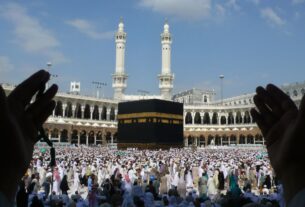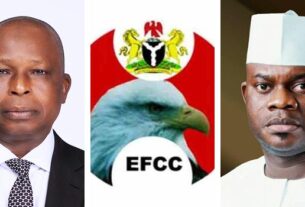Nigeria, the country adjudged to be the most populous country in Africa has far too often been described as a ‘sleeping giant’ by local and international political analysts cum commentators due to her stifled growth and missed opportunities to actualize developmental goals. But ironically, within the bowels of this ‘sleeping giant’ is an implosive turbulence induced by various active antagonistic forces, ranging from sociocultural and religious forces to economic and political ones.
Our national space has in the last month been turned into a theatre of social unrest. During this period, protests, demonstrations, and rioting rocked some major cities of the country. During the turmoil, brazen acts of arson, vandalism, looting, and physical violence incarnated the fears and concerns that the government and anti-protest campaigners already expressed. While the government tried to justify its strong objection to the planned protest with the violence and destruction that the protests eventually left in its trail, the protesters blamed the unintended consequences of the protest on government-sponsored anti-protesters, some overzealous law enforcement agents, as well as miscreants who exploited a tensed and chaotic atmosphere to ignite violence and perpetrate crimes.
It is noteworthy the war of words that broke out between the protesters and the government in the days leading to the protests. While protest organizers and their proponents insisted on their constitutional right to protest, government spokespersons reiterated the rights of all citizens to freedom of movement and to go about their legitimate businesses without being harassed or molested by any protesters.
Also, during the days that preceded the protests, the government had labelled the protest organizers as some faceless individuals lurking within the country’s perimeters and believed to be working in concert with their friends in the diaspora. This faceless group it claimed, was instigated by some political enemies who were hell-bent on fanning the embers of hatred, chaos, and violence to disrupt peace and emplace anarchy. Many government apologists portrayed these perceived political enemies as a bunch of sore losers who are still smarting from their defeat in the last general election and attempting to use the backdoor to effect an unconstitutional change of government.
As I boldly take sides with the reason adduced by the protest organizers that the rallying points of the recent protests were hunger, hardship and multi-dimensional poverty, I also passionately condemn the attempt of malicious politicians involved in the propagation of toxic bigotry to cause chaos and distract the government. At the same time, I couldn’t stop wondering at the magnitude of resources the current administration deployed into the funding of anti-protest propaganda machinery and the magnitude of perverted skills and expertise that went into its oiling and fuelling. To dissuade the youths and avert the protest, rhetoric characterized by sophistries and polemics permeated the news and social media while gaslighting shenanigans became the day-to-day activities of government strategists.
Be as it may, I say without equivocation that there will never be a superior reason for the recent protest than the natural spurs of hunger and poverty going by the rate of palpable hunger precipitated by an array of harsh economic policies unleashed on the masses at the onset of this administration’s life. Nigerians have never had it so bad. They have never been this hungry and poor at any time in the country’s history. The August protests hash-tagged the “#Endbadgovernance ”, whose news ricocheted around the world with an epochal force like the #Endsars protest of 2020, will in no uncertain terms, become a reference point and would go down in Nigeria’s history and the history of this administration as a landmark nation-wide protest against “bad governance”.
However, in one of my private moments of reflection, I found a reason to query and fault the choice of the hashtag adopted by the #Endbadgovernance protest’s organizers. As a matter of opinion, a narrow and specific hashtag like #Endhunger or #Endhardship could have been a more realistic choice. In my musings, I concluded that it could be a near-impossible task to end bad governance in Nigeria without an eighteenth-century-like revolution, bearing in mind the progression and depth of bad governance in the last fifty years.
While condemning all sorts of criminal activity that emanated on the side of the recent protest, I commend all peaceful protesters and the professional conduct of some of our internal security agents in terms of how they effectively managed the tense atmosphere and prevented crises from occurring in some locations within the country. Indeed, it never for once crossed my mind that the protesters would show up at some notable hot spots considering the show of force that was marked by the heavy presence of armed policemen in various places around the country. Lest I forget, as the government might also have felt, I never felt the protesters could have the energy and determination to sustain the protest beyond a day or two in the face of widespread hunger and battered psyches. At my best generous prediction, I would have at most given them a grace of three days to wrap up the cacophony. Who could in this world of common sense believe that the oppressed masses of Nigeria would remain undaunted and undissipated after decades that the ruling class have employed poverty and deprivation as weapons of subjugation against them? But there is one thing I cannot deny, their feats have made me realize that when oppression fails to kill its victims, it makes its victims stronger and more determined.
Interestingly, a few days into the protests, the president whose vibes and body language of playing possum initially signalled calling the bluff of the protesters could no longer continue to ‘fiddle while Rome burns’. He finally bowed to the intense pressures of the moment to address the country on national television. In response to the hunger and poverty alleviation-themed demands of the protesters, which at its core were the demands for the restoration of fuel subsidy and the reduction of electricity tariff, the President admitted that there is widespread hardship and poverty in the land but contradictorily, went ahead to link the cause of the protest to the handwork of some envious and malicious political opposition. He also seized the opportunity of the occasion of the national address to reel off his administration’s achievements many of whose impacts are yet to be felt by the masses. In the same vein, one could say that some of his outlined achievements during the address were merely symbolic gestures. To my utmost dismay and disappointment, his address to the nation did not address a single demand of the protesters. On the whole, the President’s key message to them revolved around the words ‘patience’ and ‘hope’.
In my estimation, the President’s refusal to budge and concede could be understood in one of these two ways: Firstly, it seems to underscore the administration’s convictions and confidence in its policies, or secondly, it shows the level of contempt his administration has for the masses. At the moment, the protesters seem exhausted and have agreed to suspend the protests until October 1 this year. They have tragically returned to their homes without having any items on their demand list granted by the President. The greater tragedy unfortunately was the loss of lives and property. A total of 17 people including comrades, innocent bystanders, law enforcement agents, and miscreants lost their lives during the protest. Scores were injured and many businesses were looted while properties worth billions of naira were either vandalized or destroyed. At the last count, about 1,135 people were arrested and detained nationwide in connection with the protests. All this water has passed under the bridge, yet the President in his wisdom has refused to yield. Not even a compromise – the weakest form of conflict resolution, was considered to dignify their protests. One thing is, however, clear to all. Nothing has so far been resolved. Peace of the graveyard has been forced upon the land, the status quo of inequity subsists, and the Day of Reckoning has been postponed. It’s less than two months to October 1 when the protesters promised to return to the streets. I believe they will be back as promised, not because I repose any trust or confidence in their courage and determination, but because I am convinced that in the absence of positive changes in the present life of the common man, the natural spur of hunger would push him back on the street. However, as the lives of the masses continue to be degraded through the exploitation of the ruling elites and their cohorts, the lure of life in them will continue to decline until it gets to a dangerous low where dying and death will no longer have any meaning to them. In my reckoning, the most dangerous soldier is the one who is prepared to die in battle, and that philosophical judgement is reinforced by a popular saying, “To win a battle, die before going to war”.
Nevertheless, the tale of the impending is not all about woes as there is still a way to forestall the gloomy scenario painted earlier – the present administration must be able to turn the situation around for the better before the next protest date. Notwithstanding, let me quickly add that nothing guarantees that the protesters will be able to achieve their demands in October, yet the government must realize the danger of incessant protests and riots because they are the training grounds for future revolutionaries. The government ought to be timely informed, that there is grave danger in always relying on propaganda and use of force to suppress the people’s agitations. A few days ago, former President Obasanjo during an interview raised an alarm when he referred to the country as sitting on a keg of gunpowder due to how leadership is responding to the agitations of Nigerian youths. I believe his warning should be taken seriously. How the government manages the breather it is presently allowed by our troubled youths will go a long way to determining the country’s future. Finally, if I am asked to assess and comment on the facts on the ground, my simple answer will be, “I see an uneasy calm before the final storm”.






